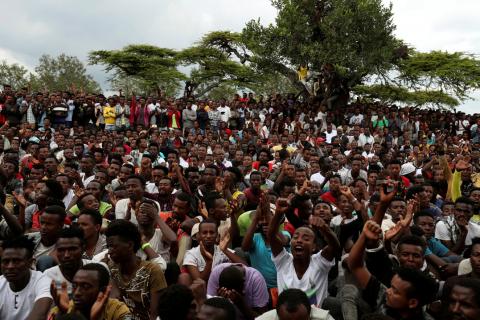Advertisement
Protesters take to streets to declare new Ethiopian region
HAWASSA, Ethiopia (Reuters) - Protesters in the Ethiopian city of Hawassa blocked roads and burned tires on Thursday after security forces thwarted a meeting of activists to declare a new region for their Sidama ethnic group, witnesses said.
The declaration would be a test of whether Prime Minister Abiy Ahmed's federal government can stick to its commitment to peaceful political reforms amid increasing demands from competing ethno-nationalist groups.
Hawassa is the capital of the multi-ethnic Southern Nations region but some Sidama - who make up the largest group there - want it as the capital of their own new entity.
Almost all shops were closed and few cars were on the streets in Hawassa on Thursday as protesters wearing traditional red, white and yellow striped Sidama scarves and hats marched to the venue of a planned meeting of Sidama elders and youth.
But activists told Reuters that security forces prevented them from accessing the meeting venue, and that mobile data had been blocked in an apparent move to impair their means of communication.
There were no immediate reports of violence. Ethiopian authorities had no immediate comment on the situation in Hawassa, 275 km (170 miles) from the national capital Addis Ababa.
On Tuesday, the National Election Board tried to defuse the situation at the last minute by promising the Sidama they could hold a referendum on having their own region within five months.
But some activists said they had already requested a referendum a year ago with no response. The constitution guarantees the right to a referendum within a year, but does not say what should happen if it is not held.
The federal system in Africa's second most populous country is designed to allow larger ethnic groups a degree of autonomy.
But smaller communities like the Sidama, who comprise about 5% of Ethiopia’s 105 million people, say they have been sidelined. In addition to the Sidama, at least eight more ethnic groups are campaigning for their own regions.
The Horn of Africa country has seen an explosion of violence since Abiy began his reforms, which have included ending bans on political parties, releasing political prisoners and welcoming home rebel groups.
(Writing by Omar Mohammed; Editing by Mark Heinrich)



















Add new comment